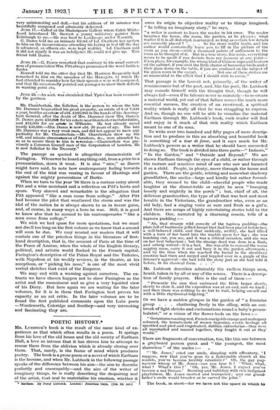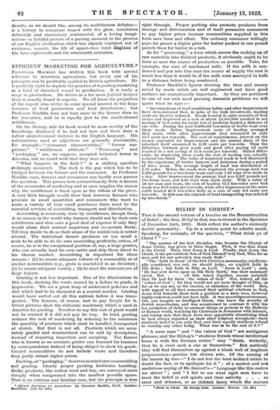POETIC HISTORY.* Ma. LUBBOCK'S book is the result of the
same kind of ex- perience as that which often results in a poem. It springs from his love of the old house and the old society of Eariham Hall, a love so intense that it has driven him to attempt to rescue them from the oblivion which is already closing over them. That, surely, is the frame of mind which produces poetry. The book is a prose poem or a novel of which Earlham is the heroine, and when Mr. Lubbock in the following passage speaks of the difference between his aim—the aim to describe perfectly and unescapably—and the aim of the writer of imaginary things, he is really describing the despairing zeal of the artist, that zeal to materialize his emotion, whether it Sadism. By Percy Lubbock. London: Jonathan Cape. [105. Od. net.]
owes its origin to objective reality or to things imagined. " In telling an imaginary story," he says,
"a writer is content to leave the reader in his error. The reader imagines the house, the room, the garden, as he pleases ; what matter if it is all distorted, rearranged, so long as certain few details are correctly placed ?. . So the story might begin, and the author would contentedly leave you to fill in the picture of the room as you chose—with a thousand points of unlikeness to the room as he thought of it. But in a true story, like mine, everything seems to be spoilt if you deviate from my memory at any point— if you place, for example, the wrong kind of Chinese cups and beakers on the cabinet, if you omit the little cluster of humming-birds under their glass dome on the table, if you arc confused on the subject of the green roses in the carpet. . . . Not one of them strikes me as unessential to the effect that I should wish to evoke."
That passage is the lament not, primarily, of the writer of reminiscences but of the poet, and, like the poet, Mr. Lubbock may console himself with the thought that, though he will always fail—even if he labours never so minutely—to re-create a material world, yet out of that failure comes the much more essential success, the creation of an emotional, a spiritual reality which is really all that he was struggling to express. And so, though no one will be able to visualize the material Earlham through Mr. Lubbock's book, each reader will find and enjoy in it much of that rich reality which Earlham meant to one of its sons.
To write over two hundred and fifty pages of mere descrip- tion and to produce in this an absorbing and beautiful book is something of a tour de force, and it says much for Mr. Lubbock's powers as a writer that he should have succeeded in doing so. The book is divided into three parts—" indoors," " In the Garden," and " Outside and Beyond." We are shown Eariham through the eyes of a child, or rather through the mature and sensitive mind of one who saw and haunted it as a child. People, in plenty, move through the house and garden. There are the gentle, retiring and somewhat shadowy grandfather, the uncles—large and kindly but rather formid- able, they seemed to the child—cheerful people who made laughter at the dinner-table or might be seen " lounging loosely and mightily in the porch " ; but, chief of all, the delicious grandmother, the type of all that was best and most lovable in the Victorians, the grandmother who, even as an old lady, had a singing voice as sure and fresh as a girl's. And there are scraps of highly entertaining stories told to the children. One, narrated by a charming cousin, tells of a tapioca pudding :- " Ab, that strange wild comedy of the tapioca pudding—the plate full of loathsome jellied lumps that had been placed before her, a well-behaved child, and that suddenly, swiftly, she had tilted with a turn of her hand into the napkin upon her lap ; she was lunching out, you see, and it was a critical occasion, and she was on her best behaviour ; but the strange deed was done in a flash, and nobody noticed—it is a fact. She was able to conceal the warm sagging mass, carry it out and bury it in the garden afterwards ; and by the time when she reached the burial in the shrubbery emotion had risen and surged and toppled over in a gurgle of tho listener's approval—she had told the story just as she had told it before, In its classical form. . . ."
Mr. Lubbock describes admirably the endless things seen, heard, taken in by all or any of the senses. There is a descrip- tion of family prayers. Here is the end of them :-
" Presently the arm that embraced the Bible began slowly, slowly to close it, and the exposition was at an end, and we knelt ; and then there was nothing to do but to wait, helping oneself out with a little rhythmical fidgeting."
Or we have a sudden glimpse in the garden of " a feminine group . . . chattering freely in the offing, with an out- break of light shrieks and exclamations round a baby's peram- bulator," or a vision of the flower-beds on the lawn :— " Geraniums roasting-red, French marigolds orange and mahogany coloured, the tomato-note of waxen begonias, exotic herbage all speckled and pied and ringstraked, dahlias, calceolarias—they were all marshalled and massed together, they fought it out as they would."
There are fragments of conversation, too, like this one between a greybeard parson guest and " the youngest, the most shameless " of the uncles .
" ' Mr. Jones,' cried our uncle, dimpling with effrontery, ' suppose, now that you've gone to a fashionable church at the seaside, you've become terribly ritualistic 1 ' Oh, the gay pug- nacious whoop of Mr. Jones—can you hear it ? What, what, what ? What's this ? " Oh, yes, Mr. Jones, I expect you've become a sad Roman.' Bursting and bubbling with rich indignant playfulness, Mr. Jones snorted and trumpeted ; and our grand- father's smile would broaden as he carved the joint."
The book, in short—for we have not the space in which to dawdle, as we should like, among its multifarious delights— is a history in miniature tinged with the glow, sometimes delicately and charmingly sentimental, of a loving imagi- nation—a faithful picture of a passing moment in the process of our English civilization which has already vanished out of existence, namely, the life of upper-class rural England of the later eighteenth and the nineteenth centuries.















































 Previous page
Previous page